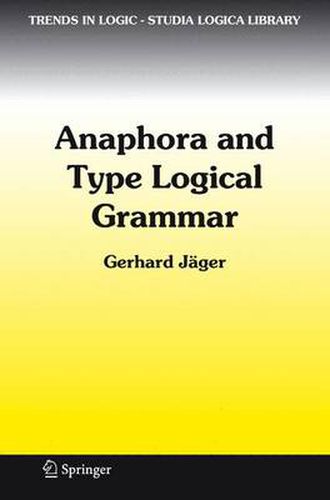Readings Newsletter
Become a Readings Member to make your shopping experience even easier.
Sign in or sign up for free!
You’re not far away from qualifying for FREE standard shipping within Australia
You’ve qualified for FREE standard shipping within Australia
The cart is loading…






This title is printed to order. This book may have been self-published. If so, we cannot guarantee the quality of the content. In the main most books will have gone through the editing process however some may not. We therefore suggest that you be aware of this before ordering this book. If in doubt check either the author or publisher’s details as we are unable to accept any returns unless they are faulty. Please contact us if you have any questions.
ThisbookdiscusseshowTypeLogicalGrammarcanbemodi?edinsuch awaythatasystematictreatmentofanaphoraphenomenabecomesp- sible without giving up the general architecture of this framework. By Type Logical Grammar, I mean the version of Categorial Grammar that arose out of the work of Lambek, 1958 and Lambek, 1961. There Ca- gorial types are analyzed as formulae of a logical calculus. In particular, the Categorial slashes are interpreted as forms of constructive impli- tion in the sense of Intuitionistic Logic. Such a theory of grammar is per se attractive for a formal linguist who is interested in the interplay between formal logic and the structure of language. What makes L- bekstyleCategorialGrammarevenmoreexcitingisthefactthat(asvan Benthem,1983pointsout)theCurry-Howardcorrespondence-acentral part of mathematical proof theory which establishes a deep connection betweenconstructivelogicsandthe?-calculus-suppliesthetypelogical syntax with an extremely elegant and independently motivated interface to model-theoretic semantics. Prima facie, anaphora does not ?t very well into the Categorial picture of the syntax-semantics interface. The Curry-Howard based composition of meaning operates in a local way, and meaning ass- bly is linear, i.e., every piece of lexical meaning is used exactly once. Anaphora, on the other hand, is in principle unbounded, and it involves by de?nition the multiple use of certain semantic resources. The latter problem has been tackled by several Categorial grammarians by ass- ing su?ciently complex lexical meanings for anaphoric expressions, but the locality problem is not easy to solve in a purely lexical way.
$9.00 standard shipping within Australia
FREE standard shipping within Australia for orders over $100.00
Express & International shipping calculated at checkout
This title is printed to order. This book may have been self-published. If so, we cannot guarantee the quality of the content. In the main most books will have gone through the editing process however some may not. We therefore suggest that you be aware of this before ordering this book. If in doubt check either the author or publisher’s details as we are unable to accept any returns unless they are faulty. Please contact us if you have any questions.
ThisbookdiscusseshowTypeLogicalGrammarcanbemodi?edinsuch awaythatasystematictreatmentofanaphoraphenomenabecomesp- sible without giving up the general architecture of this framework. By Type Logical Grammar, I mean the version of Categorial Grammar that arose out of the work of Lambek, 1958 and Lambek, 1961. There Ca- gorial types are analyzed as formulae of a logical calculus. In particular, the Categorial slashes are interpreted as forms of constructive impli- tion in the sense of Intuitionistic Logic. Such a theory of grammar is per se attractive for a formal linguist who is interested in the interplay between formal logic and the structure of language. What makes L- bekstyleCategorialGrammarevenmoreexcitingisthefactthat(asvan Benthem,1983pointsout)theCurry-Howardcorrespondence-acentral part of mathematical proof theory which establishes a deep connection betweenconstructivelogicsandthe?-calculus-suppliesthetypelogical syntax with an extremely elegant and independently motivated interface to model-theoretic semantics. Prima facie, anaphora does not ?t very well into the Categorial picture of the syntax-semantics interface. The Curry-Howard based composition of meaning operates in a local way, and meaning ass- bly is linear, i.e., every piece of lexical meaning is used exactly once. Anaphora, on the other hand, is in principle unbounded, and it involves by de?nition the multiple use of certain semantic resources. The latter problem has been tackled by several Categorial grammarians by ass- ing su?ciently complex lexical meanings for anaphoric expressions, but the locality problem is not easy to solve in a purely lexical way.